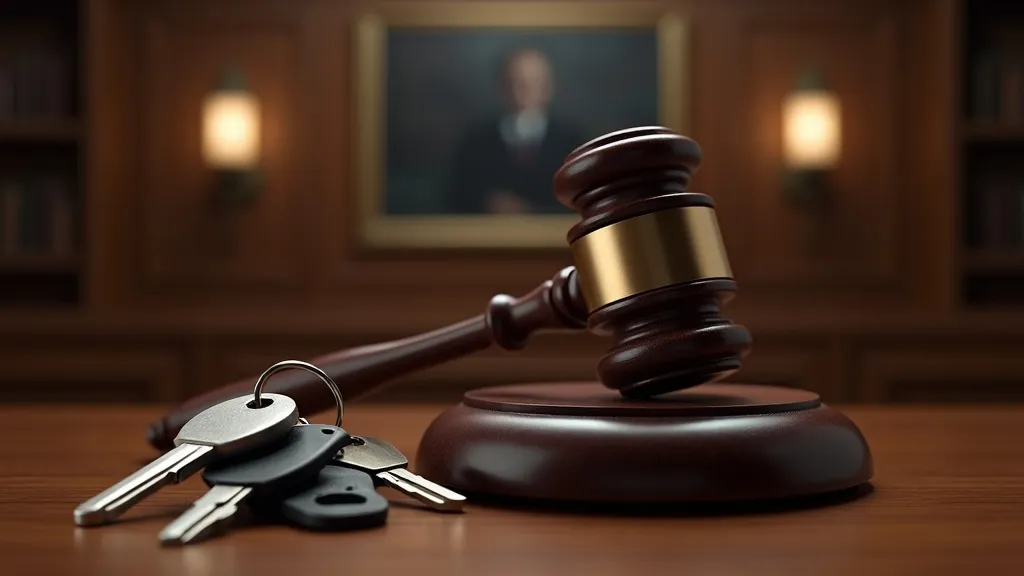Understanding Wrongful Repossession
Wrongful repossession occurs when a creditor seizes a debtor's property without following legal procedures. This can lead to significant financial and emotional distress for the affected individuals. Understanding the complexities and legalities surrounding wrongful repossession is crucial for consumers to protect their rights and navigate potential disputes effectively.

Introduction to Wrongful Repossession
In today's fast-paced world, financial transactions and obligations can become complex, leading to various disputes. One such contentious issue is wrongful repossession, which arises when a creditor unlawfully seizes a debtor's property, often a vehicle, without adhering to the due legal processes. This not only causes financial strain but also emotional turmoil for those affected. The repercussions of wrongful repossession can extend beyond immediate financial loss, often affecting credit scores, personal relationships, and even one's mental health. Understanding the nuances of wrongful repossession is vital for consumers to protect themselves against potentially unlawful actions by creditors.
Understanding the Legal Framework
Wrongful repossession is governed by a set of laws designed to protect consumers from overreach by creditors. The Uniform Commercial Code (UCC) in the United States outlines the rights and responsibilities of both debtors and creditors. According to the UCC, repossession can only occur if it does not breach the peace, meaning force or threats cannot be used. Furthermore, creditors must provide proper notice and follow state-specific laws before proceeding with repossession. Each state may have its specific regulations that dictate the repossession process, including the requirement for notice, the necessity of a court order, and the definition of what constitutes a breach of the peace.
Understanding these legal frameworks is crucial for consumers. For instance, in many states, creditors are required to issue a notice of default before initiating repossession proceedings. This notice typically informs the debtor of their delinquency and provides a grace period to rectify the situation. Failure to adhere to such practices can result in a wrongful repossession claim, giving the debtor grounds for legal action against the creditor. Additionally, various federal laws, such as the Fair Debt Collection Practices Act (FDCPA), also provide protections against harassment and unethical collection practices, further safeguarding consumers from wrongful repossession.
Signs of Wrongful Repossession
Identifying wrongful repossession can be challenging, but certain signs can indicate a breach of protocol. These include a lack of prior notification from the creditor, repossession without a court order in states that require one, or the use of intimidation or physical force during the process. Consumers should be vigilant and aware of their rights to prevent unlawful property seizure. Other indications of wrongful repossession may include:
- Inconsistent Information: If the creditor provides conflicting information about your account status or the repossession process, it could be a sign of wrongful action.
- Repossession During Inappropriate Hours: Creditors typically should not conduct repossessions at night or during early morning hours, which can infringe on personal privacy.
- Damage to Property: If the repossession is executed in a manner that causes damage to your property, this could also indicate wrongdoing.
Being aware of these signs can empower consumers to take action promptly if they suspect their rights are being violated.
Steps to Take if You Experience Wrongful Repossession
If you suspect wrongful repossession, it is crucial to act promptly. Here are the steps you should consider:
- Document Everything: Keep detailed records of all communications with the creditor, including dates, times, and the nature of conversations. Additionally, gather any related documents, such as loan agreements, payment receipts, and notices received.
- Seek Legal Advice: Consult with an attorney specializing in consumer rights or wrongful repossession to understand your legal options. An attorney can provide guidance on the best course of action based on your specific situation and help you navigate the complexities of the legal system.
- File a Complaint: Report the incident to the relevant authorities, such as the Consumer Financial Protection Bureau (CFPB) or your state's attorney general. Filing a complaint can initiate an investigation into the creditor's actions and potentially hold them accountable for any violations.
- Consider Mediation: Some disputes can be resolved through mediation, a process that can save time and resources. Mediation allows both parties to discuss the issue in a neutral setting and work towards a mutually agreeable resolution.
- Reclaim Your Property: Depending on the circumstances, you may be able to reclaim your property from the creditor. If the repossession was indeed wrongful, you could negotiate with the creditor for the return of your property.
Additionally, consider reaching out to consumer advocacy organizations that can provide resources and support in cases of wrongful repossession.
Comparison Table: Legal Protections Across States
| State | Requirement for Repossession |
|---|---|
| California | Notice required; breach of peace prohibited; court order not needed. |
| New York | No notice required; breach of peace prohibited; court order not needed. |
| Texas | No notice required; breach of peace prohibited; court order not needed. |
| Florida | Notice required; breach of peace prohibited; court order not needed. |
| Illinois | Notice required; court order needed in certain situations; breach of peace prohibited. |
| Ohio | No notice required; breach of peace prohibited; court order not needed. |
| Pennsylvania | Notice required; breach of peace prohibited; court order not needed. |
This table provides a snapshot of the varying legal requirements across different states, emphasizing the importance of understanding local regulations when it comes to repossession rights.
FAQs
- What is wrongful repossession? Wrongful repossession occurs when a creditor seizes property without following legal procedures.
- What should I do if my vehicle is wrongfully repossessed? Document the incident, seek legal advice, and file a complaint with appropriate authorities. Additionally, consider contacting local consumer advocacy groups for further assistance.
- Can I sue for wrongful repossession? Yes, if your rights were violated, you might be able to sue the creditor for damages, including compensation for any lost wages, emotional distress, and damage to your credit score.
- How can I prevent wrongful repossession? Stay informed about your rights, maintain open communication with your creditor, and ensure all payments are up-to-date. Additionally, consider setting reminders for payment due dates to avoid any unintentional lapses.
- What constitutes a breach of the peace during repossession? A breach of the peace occurs when a repossession is conducted in a violent, threatening, or otherwise unlawful manner, such as using force to enter property or intimidating the debtor or their family.
- Is it possible to recover costs associated with wrongful repossession? Yes, victims of wrongful repossession may recover costs related to the repossession, including legal fees, loss of income, and damages to personal property.
Preventative Measures Against Wrongful Repossession
While understanding the legal recourse available in cases of wrongful repossession is crucial, taking proactive measures can further safeguard against such occurrences. Here are several strategies consumers can implement to protect themselves:
- Stay Informed: Regularly educate yourself about your rights as a debtor and the repossession laws in your state to ensure you are aware of your protections. Consider attending financial literacy workshops or consulting with financial advisors who can provide valuable insights into managing debts and obligations.
- Maintain Open Communication: If you anticipate difficulty making a payment, communicate proactively with your creditor. Many lenders are willing to work out a payment plan or deferment instead of proceeding with repossession.
- Keep Records: Maintain thorough records of your payments and communications with creditors. This documentation can be invaluable if disputes arise regarding your account status.
- Consider Refinancing: If you are struggling with high-interest loans, consider refinancing to lower your monthly payments, making it easier to stay current on your obligations.
By taking these steps, consumers can reduce the risk of wrongful repossession and maintain greater control over their financial situation.
Emotional and Financial Impact of Wrongful Repossession
The impacts of wrongful repossession extend beyond the immediate loss of property. The emotional toll on individuals and families can be profound. Losing a vehicle often disrupts daily life, affecting employment, education, and family responsibilities. Many people rely on their vehicles for transportation to work or school, and the sudden loss can result in financial instability and increased stress.
Moreover, the financial implications can be severe. Repossession not only leads to the loss of the asset but can also result in additional fees, increased insurance premiums, and damage to credit scores. A low credit score can hinder future borrowing opportunities, making it difficult to secure loans for homes, education, or other essential purchases. Many individuals may find themselves in a cycle of debt as they struggle to recover from the financial repercussions of wrongful repossession.
Additionally, the stigma associated with repossession can lead to feelings of shame and embarrassment, impacting one's self-esteem and personal relationships. Support networks, including friends and family, can be invaluable during such times; however, the social stigma surrounding financial difficulties can sometimes lead to isolation. It is essential for individuals facing wrongful repossession to seek support, whether through legal channels, counseling, or community resources.
Legal Remedies and Compensation for Wrongful Repossession
If you have experienced wrongful repossession, understanding the legal remedies available can empower you to take action. Depending on the circumstances, various forms of compensation may be pursued:
- Compensatory Damages: This includes reimbursement for the value of the repossessed property, any outstanding payments made, and additional costs incurred due to the wrongful action.
- Punitive Damages: In cases where the creditor's actions were particularly egregious or malicious, punitive damages may be awarded to deter such behavior in the future.
- Legal Fees: Victims of wrongful repossession may also seek compensation for legal fees incurred while pursuing justice, which can help alleviate the financial burden of seeking redress.
To pursue these remedies, it is crucial to consult with an attorney experienced in wrongful repossession cases. They can help navigate the legal system, gather evidence, and build a strong case to maximize the potential for compensation.
Conclusion
Wrongful repossession is a serious issue that can have lasting impacts on individuals and families. By understanding the legal protections in place and knowing the steps to take in the event of a wrongful repossession, consumers can better safeguard their rights and navigate these challenging situations. Staying informed and proactive is key to preventing and addressing wrongful repossession effectively. Additionally, recognizing the emotional and financial implications of wrongful repossession can help individuals seek the necessary support and pursue legal remedies. Ultimately, empowering oneself with knowledge and resources can pave the way for a more secure financial future and prevent the distressing consequences associated with wrongful repossession.
-
1

Explore Thrilling Adventures: Unveil the World's Very Exciting Travel Destinations
-
2

Unlock the Secrets to Maximize Your Kona SUV's Fuel Economy
-
3

Unlock the Highest Resale Profit: Expert Tips for Boosting Your Kona SUV's Value
-
4

Effortless Adaptation to Senior Apartment Living: Master the Transition with This Ultimate Strategy
-
5

Transform Your Senior Apartment into a Cozy and Charming Retreat: Personalized Touches to Make It Truly Home










